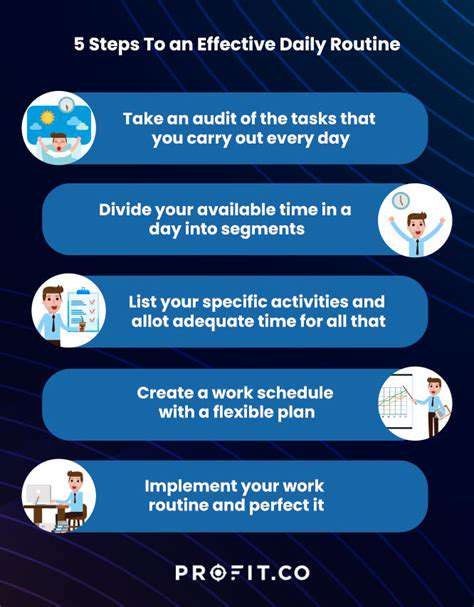How to Care for a Service Dog
Early Training Foundations
Early socialization is crucial for a service dog's development, shaping their future interactions with various environments and individuals. This process involves exposing the puppy to different sights, sounds, smells, people, and animals from a young age in a controlled and positive manner. Consistent and positive reinforcement are key elements in this process, rewarding desired behaviors and gently correcting unwanted ones. This early training period establishes a strong foundation for the dog's future training and adaptability.
Structured training sessions, even from a young age, are essential. This involves teaching basic obedience commands like sit, stay, come, and down, which form the building blocks for more complex tasks. Utilizing positive reinforcement methods, such as treats, praise, and toys, helps maintain a positive association with training and fosters a cooperative learning environment. Consistency in training methods is paramount for clear communication and ensures the dog understands the expectations.
Socialization Beyond the Home
Taking your puppy to various public places, such as parks, stores, and bus stops, is part of their socialization process. This helps them become accustomed to diverse environments and stimuli, reducing potential anxieties or fears they may encounter in the future. It's vital to ensure their exposure is gradual and controlled, allowing them to adjust to new situations at their own pace. Supervision is critical during these outings to prevent any unwanted interactions and ensure the puppy behaves appropriately.
Command Mastery and Consistency
Mastering crucial commands like stay, come, and leave it is paramount for a service dog's success. These commands are the cornerstones of their ability to perform tasks reliably and safely in various environments. Consistency in training is essential; using the same commands and cues across all training sessions ensures the dog understands the expectations and responds accurately regardless of the environment.
Regular and structured training sessions, ideally several times a day, are key to reinforcing these commands. This consistency helps the dog build confidence and understand the importance of following instructions. Using positive reinforcement techniques, such as rewards and praise, will create a positive association with training and further enhance learning.
Handling and Grooming
Regular grooming and handling are essential for maintaining a service dog's health and comfort. This includes brushing, bathing, nail trimming, and ear cleaning. Early exposure to these procedures helps the dog become accustomed to handling, which is vital for their comfort during future examinations and tasks. Consistent grooming also helps maintain their hygiene and appearance, which can be a factor in their interactions with the public.
Ensuring the dog is comfortable with different types of touch, from light pats to more firm handling, is important for their development and ability to perform tasks comfortably during their professional career. Proper grooming reduces the risk of skin issues and other health problems, maintaining their overall well-being and performance.
Understanding the Service Dog's Needs
Service dogs have unique needs that must be met for optimal performance. Understanding their physical and mental well-being is essential for ensuring a healthy and happy service animal. A balanced diet, proper exercise, and ample rest are crucial for their physical health. Regular playtime, mental stimulation, and opportunities for socializing are equally important for their emotional and mental well-being. A dog's physical and mental well-being directly impacts their ability to perform tasks effectively and safely.
Building Trust and Communication
Establishing a strong bond of trust and communication with your service dog is crucial for their success. This involves active listening, understanding their body language, and responding appropriately to their cues. A positive and supportive relationship creates a cooperative learning environment, where the dog feels comfortable and confident in their ability to perform tasks. This trust is the foundation of a successful working partnership.
Regular communication and clear expectations are vital for a service dog's understanding of their role. This creates a harmonious partnership where both the dog and handler can rely on each other. Open communication allows for addressing any concerns or difficulties encountered during training or deployment.
Maintaining a Routine for Optimal Performance and Well-being

Establishing a Consistent Schedule
A well-structured daily routine is crucial for maintaining a healthy lifestyle and optimizing productivity. By consistently following a schedule, you can better manage your time and energy, leading to improved focus and reduced stress. This predictability helps your body and mind anticipate the day's events, which can contribute to a greater sense of calm and control.
Implementing a routine also allows for better time management. When you have a clear structure for your day, you can allocate specific time blocks for tasks, minimizing wasted time and maximizing efficiency. This structured approach enables you to accomplish more within the day, allowing for more personal time and pursuits that you may not have time for otherwise.
Prioritizing Self-Care Activities
Incorporating self-care activities into your daily routine is essential for overall well-being. Prioritizing activities like exercise, mindfulness, and sufficient sleep directly impacts your physical and mental health. These activities help you recharge and reduce stress, which is vital for maintaining a positive and productive mindset.
Taking time for personal well-being isn't a luxury; it's a necessity. Self-care practices, such as a relaxing bath, reading a book, or spending time in nature, can significantly reduce stress levels and improve your mood. This contributes positively to your overall health and resilience.
Optimizing Productivity and Focus
A well-maintained routine can significantly enhance your productivity and focus. By scheduling dedicated time for work or study, you create a structured environment that promotes concentration and efficiency. Clear boundaries between work and personal time can also boost focus and prevent burnout.
Consistency in your routine helps train your brain to anticipate and adapt to tasks, which leads to improved focus and productivity. This predictability can minimize distractions and allow you to concentrate more effectively on the task at hand, enhancing efficiency and overall output.
Managing Time Effectively
Effective time management is a cornerstone of any successful routine. By breaking down large tasks into smaller, more manageable steps, you can avoid feeling overwhelmed and maintain momentum throughout the day. This approach makes achieving goals seem less daunting and more achievable.
Scheduling specific time slots for different tasks allows for better prioritization and prevents procrastination. Planning ahead and allocating time for tasks helps you stay organized and on track, reducing stress and maximizing your time. This proactive approach to time management is a significant factor in achieving desired outcomes.
Read more about How to Care for a Service Dog
Hot Recommendations
- Review: [Specific Brand] Small Animal Cage
- Why Rescuing Pets Saves Lives
- Best Pet First Aid Kits [What to Include]
- How to Help Stray Animals in Your Community
- Guide to Adopting a Pet When You Have Kids
- Top Reptile Heat Lamps
- Heartwarming Rescue Stories That Will Inspire You
- Review: [Specific Brand] Bird Cage
- Best Aquarium Filters [2025 Review]
- Review: [Specific Brand] Smart Litter Box
![Best Pet Strollers [For Seniors or Injured Pets]](/static/images/33/2025-05/ImportantConsiderationsBeforePurchase.jpg)




![A Vacation with My [Pet's Name] [Story]](/static/images/33/2025-06/ATriptoRemember.jpg)





